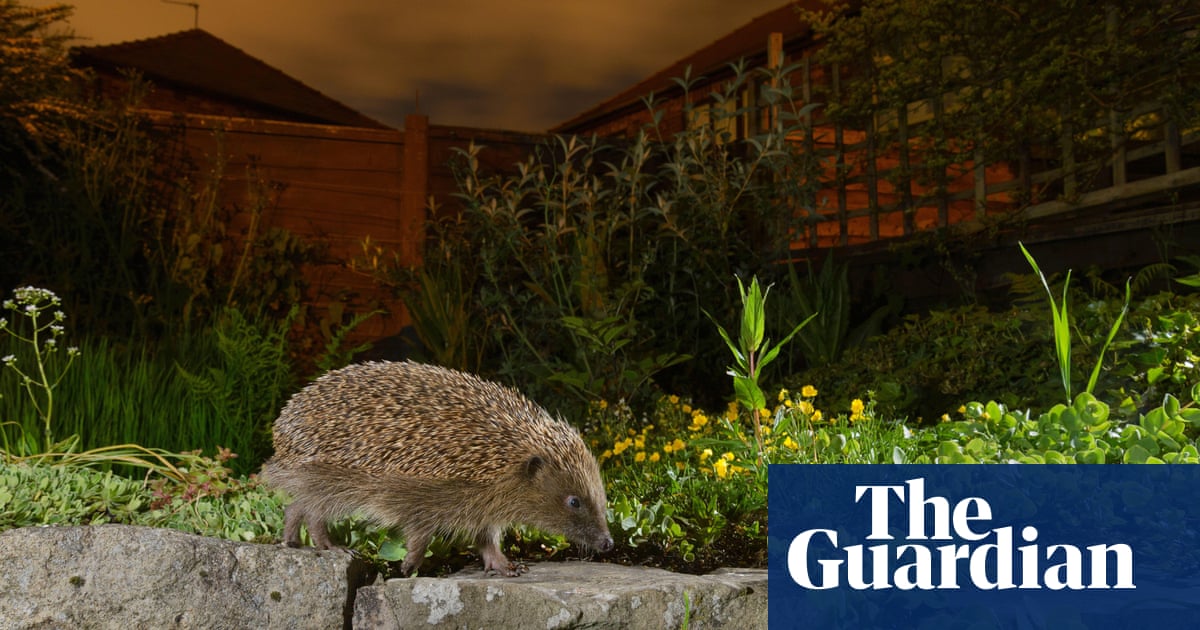
‘I don’t give a fuck about the past or glory days gone by,” sings Aidan Moffat on the opening line to The Turning of Our Bones, Arab Strap’s first new song in 15 years. “All I care about right now is that wee mole inside your thigh.”
With its gently corkscrewing guitar, taut beats and whirring strings, The Turning of Our Bones is inspired by the Famadihana ritual of the Malagasy people, who dance with the corpses of loved ones. “It’s about resurrection and shagging,” says Moffat. It’s also an apt and darkly comic metaphor for the back-from-the-dead return of a band for whom sex was an integral topic. The band is even named after a sex toy (not – as some believed, much to the chagrin of the band – after the later Belle and Sebastian album The Boy With the Arab Strap).
Moffat and Malcolm Middleton formed Arab Strap in 1995, broke up in 2006, reformed for live shows in 2016 and are now back with new music. “After we did the tours, making an album became something of an elephant in the room,” Moffat says. “It turned out the gigs were just the foreplay.” Moffat has been putting some finishing touches to the drums before we speak with a beer over Zoom. “I’m fucking knackered and I’ve hurt myself,” he laughs. “I’m so out of practice. I was unfit before lockdown but now I’m a fucking disaster zone.”
Though the musical direction changed, the working title for the album was briefly Disco Spiderland, referring to a more dance-leaning take on the post-rock soundscapes of Slint’s classic 1991 album Spiderland. There are looping acoustic numbers with an undercurrent of woozy saxophone on Another Clockwork Day, as Moffat tells the strangely poignant masturbatory story of a man overwhelmed by online porn. Compersion Pt 1 – complete with Robert Fripp-like lashings of unravelling guitar – takes its name from a polyamorous principle about the pleasure of watching your partner be intimate with someone else. “Sex and death seem to be my eternal occupations,” says Moffat.
He and Middleton grew up together in Falkirk. “We were on the same wavelength when it came to Friday night to Monday morning,” says Moffat. “Arab Strap grew out of that.” Tales of weekend debauchery became the duo’s lyrical focus. “It was personal stuff between a close circle of friends,” says Middleton, with Moffat adding, “It was intimate because there was no intention of anyone else hearing it.”
The pair borrowed a four-track recorder, made a demo and sent it out. Glasgow label Chemikal Underground responded and soon the band were making a debut album, The Week Never Starts Round Here, which was released in 1996. It was a mixture of post-rock and stark lo-fi acoustic sounds with Moffat’s tales of sex, life and death and the comedowns, mistakes and heartaches that punctuate them. It came out when Britpop had reached peak naff and Arab Strap found themselves the hangover after the party. “We were more the shite walk home alone after the party,” laughs Middleton. “There was a glossy sheen to a lot of Britpop stuff and we were more down to earth.”
Moffat echoes this. “People were looking for something with a bit more substance after Britpop. Some bands were quite throwaway and perhaps we were a little meatier.”
However, it was the band’s debut single that catapulted them into pop culture – albeit inadvertently. “The First Big Weekend was supposed to be a B-side,” says Middleton. The track depicts a hedonistic weekend of drink and drugs, staggering through Glasgow, capturing the euphoric highs of shared experiences with friends over an irresistibly fizzing beat and infectious guitar hook. It remains the band’s best-known song, having a brief stint on a Guinness advert and getting an EDM-esque spruce up in 2016, but it also created an unwanted reputation. “That song wasn’t the best advert for a new band but it became ours,” says Middleton.
“I hated it,” says Moffat. “After a couple of tours we stopped playing it. It became a bit of an albatross with people expecting us to behave a certain way. We didn’t want to be that band and I was worried it was starting to define us.”
The band also found themselves tangentially linked to another cultural phenomenon of the era: Trainspotting. “I wouldn’t say its impact was negative but it did feel like everything was measured against it for a while, which was upsetting,” says Moffat. “There was a narrow idea of what Scotland was – a presumption of where our music came from, rooted in what people took from a Scottish accent – everyone gets drunk and falls out. But our songs weren’t about a certain class or being Scottish.”
Moffat undeniably saw beauty and redemption in areas where others saw rot and gloom. “People thinking we were miserable wound me up, but we did kind of embrace it,” he says. “But there’s a lot of humour, fun and exhilarating moments too. The miserable-in-a-bedsit thing annoyed me. I’ve never lived in a bedsit in my life. I was living with my mum and dad when we made a lot of those songs – I lived at home until 24.”
The band came to a natural end back in 2006. “I don’t think we could have gone any further forward,” says Moffat. “There was nothing new to do.” Both have been busy since. Moffat has released instrumental solo albums under his L Pierre guise, two collaborative albums with jazz pianist Bill Wells as well as one with guitarist RM Hubbert, and he made a documentary about traditional Scottish folk singer Sheila Stewart. Thenumber of solo records Middleton has released since the band split stretches into double figures.
However, when they broke up things were unsteady. “I moved to the countryside for fuck’s sake,” laughs Moffat. “It was a complete disaster. I hated it. I don’t know what I was thinking, I was completely lost. I thought I was going to be a teacher for a while. I struggled with the end of the band.”
Time in the studio for the pair could be quite “fiery”, with arguments kicking off, but things have changed. Moffat says there’s been a “zen-like calm and focus” to the new incarnation, with Middleton suggesting it’s been like putting on “a pair of dirty old slippers”. The aim is very much to look to the horizon rather than over their shoulder. “We’re not trying to recapture the 90s,” says Moffat.
“It’s about making new music with new tools.” Middleton says, “There’s no point getting back together to release mediocrity.”
Arab Strap’s legacy seems to have grown in their absence. While many 90s bands dubbed post-rock – from Mogwai to Shellac – tended to explore the dynamics of quiet and loud, favouring heavy blasts of volume, Arab Strap embraced a distinct sound that remains singular. From sparse and eerily quiet lo-fi acoustic moments to beat-driven locked grooves via euphoric eruptions of guitar, it all merged with Moffat’s half-sung, half-spoken monologue vocals.
Scottish bands such as Frightened Rabbit and the Twilight Sad have cited them as an influence and in Glasgow the music venue The Hug and Pint was named after their 2003 album, Monday at the Hug & Pint. The fictional pub was a place to go on a Monday for a cuddle along with your hair of the dog after a heavy weekend. Although perhaps if the band had gone with their original album title choice of The Cunted Circus that tribute might never have been paid.
They are now signed to Mogwai’s Rock Action records. The two bands go back years. Moffat features on Mogwai’s debut album and he fondly remembers early shows in which you could tell a loud part was coming when guitarist Stuart Braithwaite would tap his foot – this was Moffat’s signal to pull out a bottle of poppers and take a giant huff to tie in with the rush of their explosive sound. “There’s nothing better than working with friends,” he says. “The idea of trying to go out and find a label to put this out … I’m not sure we’d have bothered.”












